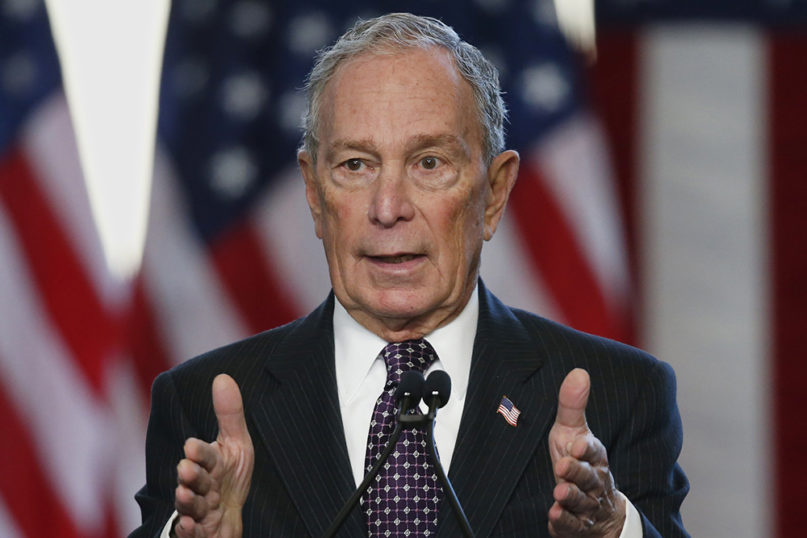(RNS) — Do you want to understand Jewish life in the United States?
You could do far worse than to analyze the Jewish identities of the two Jews who are now seeking the Democratic presidential nomination, Bernie Sanders and Mike Bloomberg.
Not that they cover the waterfront of all American Jewish identities.
But it is a good start.
This past Sunday (Jan. 26), former New York City Mayor Mike Bloomberg addressed a crowd of Jewish voters in Aventura, Florida. (Full disclosure: This is where I live).
He picked the right place. Demographically, there are few places in the world with as large a percentage of Jews as Aventura.
Which is to say: He spoke in the most Jewish (and, ethnically, most diverse) neighborhood in Florida — which is, as you know, a very purple state.
But, lest anyone think that these two Jewish men in their late 70s are similar, Mike made it clear: Bernie Sanders is a tikkun olam Jew — a Jew who wants to repair the world.
So is Mike Bloomberg. But he is also a tikkun ha-am Jew — a Jew who wants to repair his people.
“I’ve spent a lot of time in synagogues in my life,” said Bloomberg, “but my parents taught me that Judaism is more than just going to shul.
“It is about living our values,” he said, “including our obligation to help and to ‘repair the world’ in the tradition of tikkun olam, and it’s about revering the miracle that is the state of Israel, which – for their generation – was a dream fulfilled before their very eyes.”
Translation: Unlike Bernie Sanders, Bloomberg counts himself part of the religious (however defined) Jewish community.
Like Bernie Sanders, he believes that Jewish identity is also tikkun olam.
Unlike Bernie Sanders, Mike believes in the centrality of Zionism. The former mayor underscored his longtime commitment to Israel. He referred to the Magen David Adom blood center in Jerusalem that is named for his father, and the wing of Hadassah Hospital named for his mother. Tikkun ha-am.
“I will never impose conditions on our military aid, including missile defense – no matter who is prime minister.”
When it comes to Israel, he is not only not Sanders. He is also not Elizabeth Warren and Pete Buttigieg.
These candidates have declared that they would use economic leverage against Israel.
Mike spoke out against the rampant Jew-hatred that is now engulfing America. “We are confronted by sights that we thought we would never see outside of old black and white newsreels,” he told the crown in Aventura, “synagogues attacked, Jews murdered, Nazis marching brazenly and openly by torchlight. Not in some other country, but in the United States, in our Golden Medina.”
Translation: We must be on guard against Jew-hatred. Jewish security is precious.
“One solution is to secure our synagogues, to make our doors bulletproof, to install bollards and install more cameras. And sadly, I suppose we must do these things.”
Tikkun ha-am — repairing our people.
But also: “But while we harden our buildings, we must never harden our hearts.”
It’s not only repairing the Jewish people.
It is also about tikkun olam — repairing the world. We must not allow the current spate of Jew-hatred to force us to turn inward and away from other communities in crisis.
Two Jewish men cannot possibly sum up all of the subtleties and nuances in American Jewish identity.
Bernie Sanders does represent a kind of Jewish identity, albeit one that is beginning to show its age. It is a secular Jewish identity — of the labor movement; of democratic socialism, which, once upon a time, found its primary expression in Yiddish.
By “secular,” I do not even mean “nonreligious.” I mean anti-religious.
It was the secular Jewish identity of the Bundists, secular Jewish socialists of the early 20th century, who used to hold Yom Kippur balls, if only to thumb their noses at traditional Judaism.
Our grandparents would have understood and recognized that identity.
Mike Bloomberg’s Jewish identity is something quite different. “Now, I know I’m not the only Jewish candidate running for president,” he said in Florida. “But I am the only one who doesn’t want to turn America into a kibbutz.”
Translation: I am a Jew. But I am not a Jewish socialist.
Mike’s Jewish identity links him to the broader reach of the Jewish community, and its interests and needs.
He is not a Joe Lieberman type of observant Jew. Most American Jews are not. But he cares about Jewishness and Judaism.
And most American Jews do the same.
It didn’t hurt that, this past Sunday in Aventura, he delivered a full-throated devar Torah on this week’s Torah portion.
Had it been two weeks from this past Sunday, Mike could have talked about how the Israelites walked through the parted Red Sea — “the waters forming a wall for them on their right and on their left” (Exodus 14:22).
Mike Bloomberg knows that there is a wall to his political right, and a wall to his political left — and he seeks to walk down the middle.
Many American Jews walk a similar path.
“If I am only for myself, what am I?” That is about tikkun olam — repairing the world.
Jews need not, and must not, choose between those two repair missions. They want to experience themselves as having commitments to both of them.
That is why Jews like Mike.
Note: This column is not an endorsement of Mike Bloomberg.






